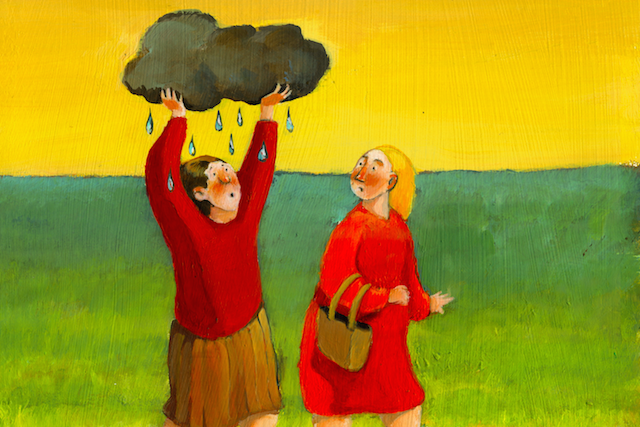
“Letting go helps us to live in a more peaceful state of mind and helps restore our balance. It allows others to be responsible for themselves and for us to take our hands off situations that do not belong to us. This frees us from unnecessary stress.” ~Melody Beattie
When our loved ones suffer, it’s hard not to get swept up in their pain. We want so desperately to fix them, to take away their hardship, and to see them flourishing.
As a control freak, I often find myself going into “fixer mode” when my partner is struggling with work stress, which only makes me more anxious when nothing I suggest works, and him more frustrated when I get so preoccupied with his issues.
Then, after all my frantic attempts at control, there’s a little voice inside that tells me to stop. To listen. To be there for him without trying to change anything. To witness his pain and sit next to him while he feels it.
In this way, it’s not my job to fix his problems. It’s my job to be there for him with love as he figures out how to handle his own suffering. I am freed from feeling the responsibility of taking on his pain.
Here are a few tips for how to not get overwhelmed when others are suffering.
Realize that being supportive doesn’t mean fixing their problems.
I often think back to when my mental health was at its worst. I dealt with debilitating panic disorder, agoraphobia, and depression, and I can’t imagine how difficult it must have been for my family to see me suffering so greatly.
But what I am most grateful for during that time is that my loved ones never tried to fix me. They didn’t become obsessed with finding a solution, and they didn’t rush me to get better. All of that would have increased my anxiety tenfold.
Instead, they simply supported me. They constantly let me know that they were there for me if I needed them. Just knowing that I had someone to count on if things got hard was incredibly helpful.
One way we can be supportive of others is to practice listening without the intent to respond with solutions. What would that be like if we simply held space for others without needing to respond?
I took a yoga workshop recently where we partnered up with a stranger and took turns sharing our struggles. The one not speaking had to simply listen and was not allowed to respond.
So we practiced listening with our whole bodies, hearts, and minds, released from the need to think of something to say in return. Instead, we got to be a loving witness to this person’s experience.
Sometimes all that our loved ones need is to be seen and to know that someone is there for them.
Allow them to find their own way.
This can be hard. It’s hard to let go of control so much that you allow other people to have their own journeys. If my family or partner had stepped in during my rough patches with panic disorder, I wouldn’t have gone through the trenches of it myself.
I wouldn’t have learned my own strength. I wouldn’t have been so amazingly transformed, body, mind, and soul, as I am now.
At that time, I didn’t need someone to take away my pain; I needed someone to be there with love and patience as I experienced my own pain.
Can we offer loving suggestions? Sure. Can we help them in productive ways? Of course. But at the end of the day, it is their lesson to learn. And we have to practice letting go of the outcome.
When a relative passed from cancer a couple of years ago, it was horrifying to see her transform from a vibrant woman to a frail, bedridden one, writhing in pain. Those last few days, she lost her vision. She couldn’t eat or drink. All she wanted was for the suffering to end.
After witnessing this, I automatically wanted to take on that pain. I felt it as my own. I started to suffer the pain she was experiencing.
Eventually, I had to realize that this was her journey. This was her pain, not mine, and I didn’t have to take that on. It actually doesn’t help anyone or anything for us to carry around pain that isn’t even ours.
Realize that you’re only responsible for yourself.
You can’t control other people. You can’t control who suffers and who doesn’t. And what a burden that would be if we felt we needed to safeguard everyone in our lives from pain. That’s too overwhelming.
You are only responsible for yourself. So how can you take better care of yourself as you care for others?
If there’s someone in your life who is going through a rough time, you have to respect your own limits. You have to set boundaries in how much you can safely and lovingly give.
Giving to others when we are depleted ourselves doesn’t serve us, and it doesn’t serve them if they aren’t receiving your help out of love, but out of obligation or fear.
Instead, find ways you can care for and respect yourself so that you can be available as a support if that feels appropriate and safe for you.
Practice grounding back into your own body and energy field often.
When we’re caring for others, we may have a tendency to take on their energy. It’s like when we’re around an angry person. Even if we’re not angry ourselves, we may feel our heart quicken, our breathing become shallow, and our temperature start to rise.
Practice grounding back into your own body so that you can recognize what’s yours and what is not.
One way to do this is to get physical, connecting back to your own body through yoga, exercise, and dance.
Immerse yourself in nature. I love to go hiking when I get overwhelmed with others’ energy and allow the grounding energy of the earth to support me. Spend time alone.
Anything you can do to bring your attention back to your own body will serve you in grounding your energy.
—
It can be very difficult to separate ourselves from others and to let go of needing to take away our loved ones’ pain. It’s something I still struggle with, but I’m learning every day that I am not responsible for anyone else. I can be there with love and kindness, but beyond that is out of my control.
All I can control is how well I care for myself, so that this love can then ripple out in support of others.
About Malia Bradshaw
Malia Bradshaw is a yoga teacher, writer, and mental health advocate. You can find more of her work, including her life-changing Meditation Program for Anxiety, blog, e-books, yoga videos, and more at maliayoga.com. To connect, follow her on Instagram @yogaforanxiety.













 Though I run this site, it is not mine. It's ours. It's not about me. It's about us. Your stories and your wisdom are just as meaningful as mine.
Though I run this site, it is not mine. It's ours. It's not about me. It's about us. Your stories and your wisdom are just as meaningful as mine.
BEAUTIFUL and INSPIRING! Thank you for sharing your insight and wonderful message! 🙂 Grateful to have read this reminder (yup, I’m a fix it person too! ha)
I have heard the term “askhole” used to refer to someone who asks for advice and then shoots down each idea offered by the other person. However, when this happens, I try to take a step back and realize maybe what they are REALLY asking for is someone to listen, to sit with their pain and confusion and discomfort. Thus, they’re going to reject every piece of advice because advice is not really want they want. We all just want a human connection, and to know we’re not alone in our suffering (IMHO). Wonderful to hear your loved ones have let you “find your own way” while dealing with struggles and you now can offer the same to others. Excellent post! Thanks for sharing. 🙂
what do you do when a friend is a bottomless pit of need? it’s exhausting.
Thank you for this reminder.
test
I really need to remember this! My boyfriend is in a very challenging life situation. Actually he has been for the past 9 years, for he has an unplanned child (well, unlanned from his side) with his ex who has borderline personality disorder. He was way too young when his child was born and although he loves his son he has never really stopped struggling with being a father and sacrificing most of his wishes and plans for life at a very young age. He grew up without a father himself and wanted to do it better later in life. When he had a child he didn’t want at age 21, with a woman who is incapable of treating the people close to her with love it made him feel like he was trapped in a cage that kept him from developement.
I got severe depression, because I tried to take away the pain and as I realised I wasn’t able to and this situation was never going to change, I started to fall apart. I felt so helpless, nothing seemd to be in my control. I felt his pain but wasn’t able to solve his problem because it wasn’t mine. I still have to learn that. Sometimes it’s just so hard to see him struggling with what life throws at him and not to rush to him for help. I have a tendency to stop whatever I’m doing right now in life to be there fo him day and night. All the while he seems completely unwilling to develop a healthy perspective on his life situation and shoots down every piece of advice or every new idea I try to give him. It is quite exhausting.
This is far easier said than done in most situations. It is easy to “check-in” with a friend and hold space when needed. The truth is you have no skin in the game and can come and go as you please. However, what about a spouse, a child, a parent, somebody who is making your life a living hell on a day in and day out basis because they can’t get out of their own way and you are tied to this person by family or martial bond.
This happens all the time in cases of addiction, irresponsibility, and just really bad compulsive selfishness and irresponsible decision making and the person left to “hold space” must continually pick up the pieces. THIS is the tough part of holding space and it is REALLY hard work which often does not have a very happy ending. We can all agree to hold space in easy situations, it’s the ones in which another’s bad decisions have a very real and lasting affect on us that are the tough ones.
Attached and detached, just like to electric socket, or the mirror, engage and disengage. It is near impossible as human with the 8th consciousness.
But taking on other’s suffering is the cause for compassion fatigue, we can only do so much. Thus, the Buddhist practice of daily cleanse of using the 7 limbs prayers is so important.
Agree! Often we succumbed into the idea that we are responsible for everyone we care about sucking their pain and problems as our own. Unfortunately we end up beaten and defeated because of this. Stepping back and remembering that our responsibility is our OWN. As they always say, you can’t give something you don’t have.